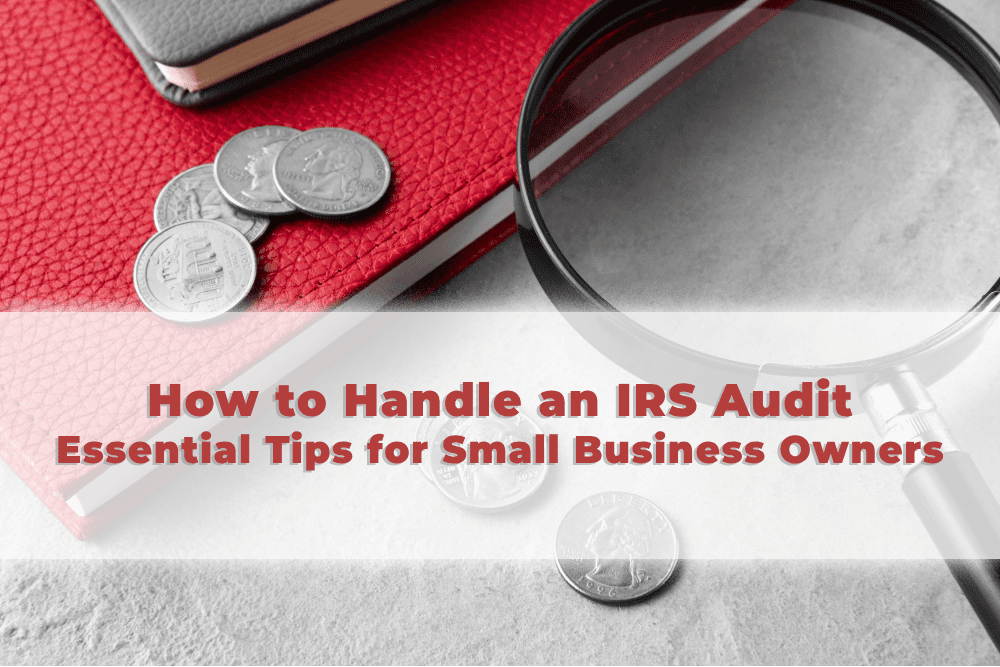An IRS audit can feel intimidating, but with the right knowledge and preparation, small business owners can handle it effectively. Whether you’re being audited for the first time or want to ensure you’re prepared just in case, understanding how to handle an IRS audit for small business will help you stay calm and organized throughout the process. In this guide, we’ll walk you through essential tips to navigate an IRS audit and avoid common pitfalls.
What is an IRS Audit?
An IRS audit is a review of your financial records to ensure that all information reported on your tax return is accurate. Audits can result from red flags in your return, random selection, or comparisons with other businesses in your industry. While most audits are conducted via mail, the IRS may also request an in-person meeting.
Why Small Businesses Get Audited
Understanding why audits happen can help you avoid the most common triggers. Here are some reasons small businesses may be selected:
- High Deductions Compared to Income: Claiming significantly more deductions than businesses of similar size can catch the IRS’s attention.
- Errors on Tax Returns: Mistakes in reporting income or expenses can raise red flags.
- Cash Transactions: Businesses that deal heavily in cash, like restaurants, are more likely to be audited.
- Home Office Deductions: Claiming excessive or improper deductions for a home office is a common trigger.
How to Prepare for an IRS Audit
Preparation is key to handling an audit confidently. Here are steps to take if you receive an audit notice:
1. Read the Audit Notice Carefully
The IRS will send a notice explaining what they need. It will specify whether the audit is being conducted by mail or in person.
Curious about what your IRS notice means? Check out this helpful guide from the IRS to decode it with ease.
2. Gather the Necessary Documents
The IRS will usually specify the records they want to review, such as:
- Bank statements
- Receipts
- Previous tax returns
- Payroll records
3. Consult a Tax Professional
A CPA or tax professional can help you navigate the process and respond appropriately. Their expertise can also prevent unintentional errors that might escalate the issue.
4. Respond on Time
Timely communication is crucial. Ignoring the notice can lead to penalties or a default judgment in the IRS’s favor.
What to Do During an Audit
- Stay Honest
Always provide truthful and accurate information. Misleading the IRS can lead to penalties or even legal consequences. - Be Polite and Professional
Treat the IRS agent with respect, even if the audit feels overwhelming. - Answer Only What’s Asked
Focus on the specific questions or documents requested. Providing additional information can complicate matters.
In-Person Audit Tips
- Bring only the requested documents.
- If you’re unsure how to answer a question, it’s okay to say, “I’ll need to check with my accountant.”
You may also like to read:
10 Common Red Flags That Trigger Small Business Tax Audits
Nobody enjoys the idea of an IRS audit, especially when you’re busy running a small business. Audits can be…
Read More

Avoiding Future Audits
To minimize your chances of being audited in the future, follow these best practices:
- Keep Accurate Records
Maintain organized and detailed records of income, expenses, and receipts for at least three years. - File on Time
Late tax returns are more likely to draw scrutiny. - Double-Check for Errors
Simple mistakes, like incorrect Social Security numbers or mismatched income, can trigger audits.
Automate Bookkeeping
Consider using accounting software or hiring a bookkeeping service to ensure accuracy.
Need a helping hand with keeping your records spotless? Let our expert team handle it for you!
What Happens After the Audit?
Once the audit is complete, you’ll receive an IRS letter outlining the results. There are three possible outcomes:
- No Change: Your records matched your return, and no adjustments are needed.
- Proposed Changes: The IRS suggests changes, and you can either agree or dispute them.
- Owe Additional Taxes: You may need to pay more taxes, interest, or penalties.
If you disagree with the outcome, you can appeal. It’s another instance where a tax professional can be invaluable.
Link to IRS resource: IRS Appeal Rights
How Taxfully Can Help
Facing an audit can be daunting, but you don’t have to do it alone. At Taxfully, we offer audit defense services to represent you, ensure compliance, and minimize stress. With our experience in tax preparation and bookkeeping, we help small businesses stay ahead of potential issues.
Final Thoughts
While the thought of an audit might be stressful, being prepared and knowing how to handle an IRS audit for small business can make a significant difference. Remember to stay organized, consult professionals when needed, and keep calm throughout the process. With the right approach, you can successfully navigate an audit and even learn ways to improve your financial practices.




